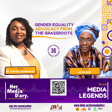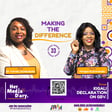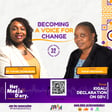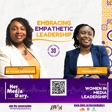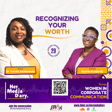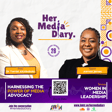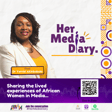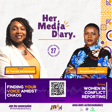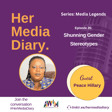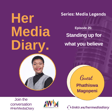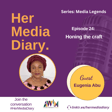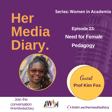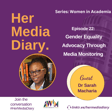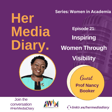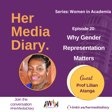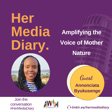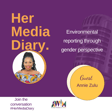Breaking Traditional Roles
00:00:00
Speaker
Oh, a girl is not supposed to be like this. A girl is not supposed to climb trees. A girl is not supposed to be interested in real estate. A girl is not supposed to be more interested in youth. I was not the conventional good girl because I didn't know how to cook until university. And so I was a rebel in that sense that I didn't fit into what is a girl.
00:00:22
Speaker
supposed to be like or what is a woman supposed to be like from a very young age because then you're not the girl that conforms to what everyone heals and so because of that I had to read a lot of books because in books I found my tribe in books I found women who thought like
Introducing Comfort Musa and Women's Media Challenges
00:00:42
Speaker
because these women were not found in our neighborhoods and in my school. And so I spent a lot of time in the library. I spent a lot of time collecting books, reading magazines, and listening to women from out of Cameroon and women from other cultures.
00:00:58
Speaker
You know, just trying to find my tribe. And I found that through books and later on through the internet to know that, oh, it's okay for a girl to think about the kind of house she wants to build. Even if she's not thinking about the kind of man she wants to be with.
00:01:17
Speaker
Welcome to another episode of Her Media Diary, a podcast that captures the lived experiences of African women in media industries. I am Dr. Yamasia Kimballa, your host. And in this episode, I'm joined by Comfort Musa, an award-winning Cameroonian journalist with a keen eye for stories that exposes social injustice.
00:01:38
Speaker
Comfort takes us through her journey of over 15 years as a female journalist covering under-reported stories with a special focus on issues that affect women and girls. Throughout this series, we'll be in conversation with trailblazing African women in media to discuss their experiences navigating the media industry, the challenges they faced, and how they've managed to excel tremendously despite these hurdles. By inviting these voices into conversation,
00:02:05
Speaker
We hope to provide tips and solutions to breaking down barriers faced by women in media.
Comfort Musa's Journey into Journalism
00:02:14
Speaker
All right, so great to have you here, Comfort Musa. I think this is our third attempt at this. Yes. So good time to connect. We've never met, but you're from Congo. Not yet. Not yet, exactly. But we've been interacting for the last, I don't know, three or so years or so.
00:02:34
Speaker
Right. Yeah. So, but it's a great opportunity to at least get to know you a bit better. So tell me about the woman behind the amazing journalism. Where did you grow up? So I was born and raised in, in Cameroon and I am actually in the career I always dreamt I would be in as a child. So, uh, as a child, I wanted to be a journalist. I wanted to tell stories and I'm glad that I grew up and I'm actually leaving my childhood dreams as a journalist.
00:03:04
Speaker
And this is the only job I have done all my life. So I've been homeless for 15 years now. I started out with radio, radio journalism, and then I got on to the internet, web reporting, newspaper, TV.
00:03:24
Speaker
and now I'm doing corporate communication for an international NGO and still reporting freelance on the site when I find a story that I really want to tell.
00:03:35
Speaker
outside of my regular work. Yeah. So you're amongst the lucky few that knew what you wanted to do from a young age, but let's go as far back as we possibly can. So you're from Cameroon, so you're born in Cameroon, right? Where were you born and tell me about your upbringing. So I was born in the Northwest region of Cameroon. Cameroon has 10 regions and the Northwest region is where I was born and raised. It's one of the two English speaking regions of Cameroon.
00:04:03
Speaker
And I would say my childhood was not what the regular girls would have. So many young girls grew up with their mothers in the key chain and learning how to do all the things that we men, young girls were taught to do. But for me, I spent more time with my father in the living room, watching TV and reading newspapers. So I was not the conventional good girl because I didn't know how to cook until university.
00:04:32
Speaker
And so I learned how to cook out of necessity. Like, okay, now I need to learn because I'm living on my own, not because I was a girl that needed to learn how to cook. So I could be a good wife you get.
Inspiration and Role Models
00:04:45
Speaker
And, and so I was a rebel in that sense that I didn't fit into what is a girl supposed to be like, or what is a woman supposed to be like from a very young age? I'm glad I had the liberty to do what I liked.
00:04:59
Speaker
and to just cover myself for me. Yeah, irrespective of people saying, oh, a girl is not supposed to be like this. A girl is not supposed to climb trees. A girl is not supposed to be interested in real estate. And a girl is not supposed to be more interested in news than in romance, movies, you know, all those things. Yeah. So what was that like for you having that kind of nature drain up in, you said Northern part of Cameroon, right? The Northwest, yeah. Northwest part of Cameroon.
00:05:29
Speaker
Um, what was that like amidst your peers in school, et cetera? It was not the coolest thing because then you're not the girl that, um, conforms to what everyone heals. And so because of that, I had to read a lot of books because in books, I found my tribe in books, I found women who thought like me because these women were not found in our neighborhoods and in my school, right? So.
00:05:57
Speaker
people wanted to discuss at a very young age, fashion and relationships. And these were not my interests at the time. And so I spent a lot of time in the library. I spent a lot of time collecting books and my dad really felt that because he bought me books and I would be in the library reading, reading magazines and listening to women from out of Cameroon and women from other cultures, you know, just trying to find my tribe. And I found that through books,
00:06:25
Speaker
and later on through the internet to know that, oh, it's okay for a girl to think about the kind of house she wants to build, even if she's not thinking about the kind of man she wants to be with. So I did not feel the pressure when people said I was different, because then I had a tribe that said, you're normal. Women can aspire to this. And maybe that's why I still love books very much, because then I can listen to voices that sound like mine and see examples of women who dared to be different.
00:06:55
Speaker
and that it was beautiful. So who was telling you that you were different? It's in the neighborhoods, it's the aunties, it's the neighbors, it's colleagues and your parents at school. So this is when I was younger, like, oh, you like book, in Camarundo Calimari book, like you're a bookworm, you should learn other things, you know. And then when I went to university and I've blocked about this, when I would talk about my dream house and I would collect pictures of houses that I like,
00:07:25
Speaker
I had people say, no, these kinds of things will scare men away. A young woman is not supposed to think about the house she wants to live in. She's supposed to think about a man that will build a house for her. And so these are the things that people said to me that made me think I'm different. And later on, when I started working as a journalist in Cameroon back in the year 14, 15 years ago, I did not conform to the part. And I wanted to do different things. I was asking questions. I was challenging the stereotypes.
00:07:55
Speaker
And I have recordings of some newspapers, archive papers that they wrote in the papers that look, Kami is not a good woman because she's not married and she doesn't have children and she's spending a lot of time on the internet. So I had some of these things in print and a few times on the internet, you know, and these are the voices that try to say, you're not a regular good woman because your interests, you know, are different.
00:08:25
Speaker
These voices did not mean a lot to me because like I said, I had a tribe of other women that I had found on the internet. I was reading about other women. I was seeing that it's okay to choose your own path. And I'm glad I stayed that path because now I'm mentoring other young women and who say, oh, call me. I feel like I need to confirm and I tell them it's okay. If you want to do environmental journalism, it may not be as quote sexy as
00:08:54
Speaker
what every other person is doing, but it's okay if that's what you want to do. So you discovered your tribe of women through books. And obviously there's, we're speaking now in retrospect, looking back on, on how you've been able to kind of come through, through that, but what impact was it having on you at the time? How did it shape you? What was the reality for you?
00:09:16
Speaker
It was this well, you know, I would come back from school and I remember sitting in a living room and watching women like Oprah Winfrey. Um, in Cameroon, we had a very amazing female journalist back in the day. Her name was Anne Sanguine and she's one of the most powerful women I saw on TV, right? She had this TV show that confronted patriarchy in ways that were so radical, you know, she would
00:09:42
Speaker
do have her programs, and the next day, the men in the quarters are saying, oh, this woman on TV is teaching her women to be stubborn. And somehow I liked Aung Sanh. I really loved her. I grew up wanting to be like Aung Sanh. And for me today, one of the biggest compliments, like during my birthday a few weeks ago, someone wrote to me and said, comfort, you are the Aung Sanh of your generation. I saved that because I grew up wanting to be like Aung Sanh. She was a radical. She did not conform.
00:10:11
Speaker
She was speaking about women's issues and power of choice and empowerment. Like 20 years ago, around the time of Beijing, no, people insulted this woman. She was just, for me, she was a beacon of light. And I kept telling myself, I want to be like Ansan, she's free and she's doing her things. And when I grew up and started working as a journalist, I wrote to her and I had times when she came to my city
00:10:40
Speaker
and was part of the programs I was organizing for younger women. And you know, she shared her story with us. It's okay to be different. It's okay to speak your truth and the benefits of that. And she would respond to the emails I sent. And so she's one of the icons that made me know that, look, it's okay. It's okay to be different. And when you're different, you will shine the light for other women. So Anderson was that beacon of light for me.
00:11:08
Speaker
And so at no point did I feel lost, you know, being on my path or too alone, you know, because I had Ansan. And then with the internet, I have had a tribe of other African women storytellers. I remember when the AWDF had a story telling boot camp for
00:11:34
Speaker
African feminist storytellers. And I went to Uganda for 10 days and we had storytellers from all over Africa. It was, it was like a rebirth, you know, to know that there are other women who are using their voices in their society. And sometimes we appear in shapes and forms that a society cannot understand because we are different and they need time to process that
Being a Role Model and Facing Challenges
00:12:00
Speaker
And when they're processing like, but what kind of girl is this? What kind of woman speaks like this? Especially when it's not usual. They may call you some names, but I think in the end they understand what it is. And some of them would like it. A male journalist in my city where I grew, I've talked about how some people wrote newspapers to say I'm not a good woman. But in that same city, I have a male journalist.
00:12:23
Speaker
a colleague who had his daughter two, three years ago. And he wrote to me and said, I'm going to give my daughter your name. That for me is something that years down the line, in the same city where colleagues thought I was not a good example for young women. You can have a man who says, okay, I'm going to give my daughter your name. So it felt like I was doing the right thing. And now in retrospect, I'm glad I didn't conform.
00:12:53
Speaker
I mean, what you're describing there demonstrates very clearly the importance of representation, right? So you've spoken about, well, you couldn't see the representation of yourself. So you looked for the inbox and you talk about this as a tribe of women that you discovered through books and then through the internet. And then there was this beacon of light that you described An-Sang as being that person that you aspire to.
00:13:17
Speaker
And it's come full circle with you now being the anthem of your time, right? And having this, this colleague of yours talk about how he wants you to kind of basically be that for his daughter. Beyond being obviously proud of your achievement, what does that mean for you? Like being this person, this icon, this person that people are looking up to. And that's kind of that feeling that, okay, you got to be
00:13:45
Speaker
the An-Sang for this new generation of women and girls? For me, it's something I'm still processing, you know, because An-Sang was such a huge beacon of light. Every, every journalist in my generation would quote her. Most of the women would quote her. And I think it's just a fragment of her power. And what I tell people is that you can be like An-Sang. I don't think I have fully leafed up to, you know,
00:14:14
Speaker
the space she held, but I just think it's also powerful the impact our voices can have as journalists because she was just that, a journalist who dared to tell stories and leave her truth. And I find it powerful because when I started out as a journalist, my father, he's one of my biggest supporters and his support sounded like the advice
00:14:42
Speaker
that came in saying, comfort, uh, you want to do journalism, but journalism may not feed you in camera. You know, you need something more substantial. Journalism is not sustainable, right? Journalism is not a good plan, which is what many parents tell their children. And I'm glad I stayed. It was a risk that you could before, you know, and storytelling does not yet have this solid place.
00:15:08
Speaker
And storytellers do not have this respect because people think if you, if all you're going to do is tell stories, then you may be poor. And when you're poor, your voice is not powerful. And I believed so much in the power of stories, not just to inform my community and help people make informed choices, but also that storytelling can be a lucrative source of income, you know? And so storytelling is not just something we do to, to fill the gap. It's also a profession.
00:15:38
Speaker
that one can build and it's respectful. You can be respected and you can make money from it. You know, there was a lot of despise. There's still a lot of despise, you know, for journalists. And, and so many parents do not want their kids to be journalists. My parents did not want that for me, but I had seen Ansan. She was top, top class. And she had garnered a lot of respect for herself. And so, um, for me, I'm happy that.
00:16:07
Speaker
I was able to follow this dream in that journalism has fed me and that journalism has fed my community. You know, when people write back to say, um, like on radio, uh, I would have persons living with HIV who write to say, yo, your program encouraged me at a point when I was having societal thoughts. I had a short video recently about stigma against old people.
00:16:35
Speaker
that in some villages people think they're witches. And a friend wrote to me from Germany and said, this is something she's been losing sleep over and she's glad someone can talk about it. So things like that, let me know that our storytelling is important. It is not trivial. It is not less important. You know, when you compare it to medicine or law or engineering, it is important and journalists should be respected.
00:17:00
Speaker
and that journalists, you know, we can actually hold it with pride and do our jobs well, you know, with pride as well. I'm going to come back to kind of storytelling and, you know, your, your focus on telling like I asked you earlier on if there was one area that was your thing and what would it be? And you said it was capturing those stories that the mainstream media miss. And I think that's a really important point. Let's come back to that. How did you start your journey towards journalism?
00:17:29
Speaker
So being in this environment where you're being chastised for being who you are, where you've been kind of, you know, trying to be forced into a corner to conform and yourself having to seek out the role models that you needed to see so that you can advance. How did you navigate all of that? You said just now also that your parents didn't want you to be a journalist, right? So how did you navigate all of that to then get to where you are? I mean, to start the journey rather.
00:17:59
Speaker
Yeah, so when my parents advised me against journalism, it was from I saw it as coming from a place of love. Oh, we like that you tell stories, but you know, you can be a lawyer and still, you know, and I had to prove to myself and then to others that this can be a career choice.
00:18:22
Speaker
And again, that came through a lot of research. I was on the internet, you know, reading about people who have made a career out of journalism, people who had worked for 10, 15, 20 years as journalists who had good lives and were successful. And that felt, you know, my passion. And my parents spoke about it based on what they saw in a society. I had to look, for example, sometimes out of
00:18:48
Speaker
out of camera room to say, Oh, it's possible I can do this. And this is what I really want to spend, you know, my, my life doing. So looking for examples that this can work was good for me. Then I had this examples and this role models I could look on and grow and also having a tribe where people share their experiences. And that is how I found a wing, you know, like other African women in media and just looking at the programs.
00:19:17
Speaker
you know, then I was more comfortable and confident in what I was doing. And then for me, it was also making sure that, okay, now that I have chosen to do this against the counsel of people who love me, I better be the best. And before starting, I remember I had written in my diary and I had written in my diary that when the story of journalism in Cameroon is told, I want to be amongst
00:19:45
Speaker
the best 10 or 15. I put that as a challenge for myself. And in solutions, journalism, health reporting, I kept looking at who are the best and what was the career path like. And so that just pushed me further into learning more, developing myself, trying to be a step or two ahead. And so even when reporting online was not very popular in Cameroon,
00:20:11
Speaker
I had other female mentors who told me like, you can go on this platform and start reporting and you can make more money and get more exposure, you know, for yourself. And that is how it worked for me. You said something that resonates with me very strongly around wanting to be the best in what you do, you know.
00:20:32
Speaker
And it's something I've been grappling with for a time myself, you know, I was even saying yesterday to my sister actually that, you know, I don't like to do things where I cannot perform my best, you know. And I think there's a burden that comes with that. How has that been for you, like for you? Because I know for me, sometimes has been really, it means that
00:20:56
Speaker
where obviously you achieve something, but you don't recognize it as being the best. That thing that people are like, wow, you did this. You're thinking it's so terrible. There's just a burden, like a weight of always trying to be the best. So how's that been for you? It's been, for me, a journey of learning. I'm learning to be gracious with myself because when you set out
00:21:26
Speaker
wanting to be the best, you may never be satisfied. And so I would have radio programs and not be able to go back and listen because then I Josh the program so harshly, I could not even listen and enjoy my own programs. Or I would write a story and it's published and all I can see is the gaps and what else needs to be done. And so for so long, I wasn't giving myself
00:21:55
Speaker
the credit that I deserved and then the applause and appreciation, I could not receive it because I did not see it the way people were seeing it. I just wanted to be better. And I along the line learned how to extend grace to myself to acknowledge that, okay, you have done well, but there's room for more. And so that way I stopped judging myself harshly and putting a lot of pressure
00:22:21
Speaker
You know, just learning that, oh, you have done a story. It's true. You may have missed this or this anger, but then that just gives you, gives me more room to tell another story, you know, to, to improve on that story. And that grace, uh, makes me kinder to myself. And it also makes me to compete with just me. There's a lot of competition in the media, in the media world, you know, um,
00:22:49
Speaker
Everyone wants to be the first to tell the story. Everyone wants to be the one with the highest views, and this could pull us in all directions. I have been caught up in that trap, you know, feeling like, oh, my story did not get all the attention. But I am learning to believe in the power of one. Sometimes 10 people may read your story, and those are the 10 people that need that information at that time.
00:23:16
Speaker
And, uh, there are stories that I wrote three, four years ago, and then you have someone who is a researcher who comes back to you and say, Oh, I'm researching on epilepsy in Cameroon. And I just saw a story that you did eight years ago and it's helped, you know, in the research. And imagine if I judged the impact of that story at the time, based on who gave me feedback, you know, I would have missed out on this. So it's, it's, it's also understanding that the lifespan of my work is, is longer.
00:23:47
Speaker
than the attention I give it per time. And so that calms me and I'm not judging myself harshly and I've learned not to compete with people. That's why now I can go back and listen to my own programs and like, I made a mistake here. And then I said, okay, there is room to improve. There is room to do another one. And even when I don't get all the feedback, I have learned that sometimes people come back to me
00:24:16
Speaker
eight years later to say I read this thing and it's informed my research or some NGOs will say I read this thing and it has given us a new direction on what we need to focus on and so it's just learning to extend more grace to myself and be kinder to myself even when I want to be the best. So as I said earlier on that you responded to my earlier question before the interview around well if you said what was your
00:24:46
Speaker
One main area, what would it be? And you said it would be identifying those stories that mainstream media mean.
Telling Underrepresented Stories
00:24:53
Speaker
So tell me more about that, about the kind of stories that you do and how you got onto that path. So wanting to find and tell other reported stories, I think it's also part of the journey for me to find my own voice and hear it in media. I mean, in Cameroon, I am Anglophone. I'm a woman.
00:25:15
Speaker
The Anglophone community, we are the minority. So sometimes public information, we may not find it in English, right? And then also being a woman, you may watch mainstream critical TV debates and there are no women on the platform. And I found myself in a demographic that is not very represented. So I think me wanting to find and tell these stories was also wanting to find things that I could identify with, you know,
00:25:44
Speaker
You watch TV and there are no dark skinned women, for example. Then I want to do a program on radio about light skin. Let's talk about this because I want to find myself in it. So I, I am not just in this sense, I am not just a storyteller. I'm also someone who is not represented in media. And then I have women, I have a very close relations.
00:26:11
Speaker
who are persons with disabilities, they are not represented. So me wanting to tell stories about disability, which is something I do a lot, is also wanting to create space to bring my friends along. I want to see them on billboard. We want to watch movies and see ourselves. We want to listen to debate and hear all the parts. You know, at the start of this year, there was a deliberation on
00:26:38
Speaker
motherhood stories. And I remember sitting there and saying, can we talk about African women who choose not to have children, for example, or who are finding it difficult to have children? Can we tell their stories too? So for me, it's constantly bringing debates that I want to hear, debates that I want my sisters represented in.
00:27:05
Speaker
These are stories about me. These are stories about my community that we don't hear. So it's just creating space for this. And because I traditionally come from a demographic that is not always represented, I think it is created in me the instinct to want to find out who is missing in a room. So I look at a TV poster and immediately I'm thinking which guest is missing.
00:27:33
Speaker
There is a flood and everyone is talking about the destruction. And my instinct as a journalist is, what are we missing? Because there's always, you know, somebody whose voice is not loud enough, whose interests are not big enough to be captured by the big media platforms. And yeah, and that has become like my brand of journalism. So even in groups that share a picture, sometimes I would just pick details and my friends will be like, ah, we miss this.
00:28:03
Speaker
And that has informed the kind of stories I find and tell. And you founded SisterSpeak237. Tell us about that and the inspiration behind it. SisterSpeak237 actually started out like a block. I worked at the radio station and sometimes I would pitch ideas in the newsroom and then the colleagues would be like, ah.
00:28:26
Speaker
This one is a white man idea. White man idea by that impeachment is like, this is more for European audience, right? It's not in Cameroon. I may suggest a topic like, can we talk about women negotiating for safe sex? And I'm like, not now. Can we talk about the female condom? Not now. And so constantly, my story ideas were not found interesting enough for the radio stations.
00:28:53
Speaker
And I wanted a place where I could just talk about these things that were in my head. The questions I had, you know, I would listen to conversations and I want to expound on. So that's how SisterSpeak started. And it was also about my own journeys, traveling on the night, both in Cameroon and the constant sexual harassment. I blocked about it, I remember. And then Arafi, someone from Arafi got to me and said, can you do a radio program? Can you do a radio report on this?
00:29:23
Speaker
I did it and then many other newspapers in Cameroon picked on that story and published it. And then we started having requests for, can you also talk about this thing? Can you also talk about that one? And then I discovered I was not going to last if I was the only one telling this story. So that's how we started doing training, you know, to get other women to say, if you're in the market and you notice this kind of thing, this is how you can tell the story. You can go on air, you can send an SMS, you can do it on Facebook.
00:29:53
Speaker
And then when the trainings started, we decided to legalize it. So it went from a block to a local organization where we are now doing trainings, not just for female journalists, but we've worked with municipal cancelers because they are female cancelers. We've worked with women with disabilities, with different groups of women, just helping them to amplify their voices on issues that are important to them. But then,
00:30:23
Speaker
I remember we had a program where a lady shared about her experience, a musician shared about her experience of being raped. And she came to me, I think a month or two after that program aired to say she regrets sharing that story. And so I had to think about voice and agency because it's not enough to tell women, tell your stories. When they tell your stories in a context that is hostile,
00:30:50
Speaker
Then we give them more reason why they won't speak out the next time because what happens when they tell your stories and then there is so much backlash and sometimes they're shaming and they're attacked and then they have more losses than gains because they told your stories. That's how sisters speak started in getting into projects because with discover that voice cannot stand alone. They're supposed to be agency. They're supposed to be a healthy environment where it's possible to talk.
00:31:19
Speaker
you know, to tell this story. And that's how we've expanded to doing trainings on other issues is not enough to say victims of gender based violence should speak out, some speak out and then go back and attack. So what do we do to create an enabling environment where women can speak up and be safe, and speak up and you know, want to speak up again. And that's how sisters because evolved.
00:31:46
Speaker
to now doing local projects and trainings. And we're producing a lot of manual because our intention really is not to tell stories for people, but to let people know how to tell their own stories. So it's interesting as I'm listening to you, I'm recognizing that this theme of speaking up actually has emerged for you in several ways. So firstly, in terms of actually in the newsroom,
00:32:14
Speaker
trying to get the editors convinced to do your stories. And therefore the recourse that you had was to set up your own thing. Right. And then also this kind of sense of responsibility that you felt towards the voices of the women whose stories you were capturing. Right. So it, like you said, it's one thing to have them speak up. It's another thing to protect that speaking up, you know, and give them that agency. So for the first one though,
00:32:40
Speaker
When you're pitching these stories to these newsrooms, these stories that, like you said, are not covered by the mainstream, they're kind of, you know, the outlier kind of stories that people are still, you know, sensitive towards. How did you navigate that? How did you, yes, I know you kind of went on to do your own thing, but for those of our listeners who are facing the similar challenges right now today in 2023,
00:33:04
Speaker
trying to convince their bosses to produce this kind of story that seems so outlandish. What did you do? What would be your advice to them? So even when I started SisterSpeak and when I started reporting freelance for foreign media, I did not immediately stop my local reporting work. But what happened was now I was beginning to get a lot of attention. You know, my stories were published internationally. Some of them won global awards.
00:33:34
Speaker
And then the editors were like, huh, come create your own women's slot. You know, so I had a weekly women's program and then there was more attention, you know, because that visibility gave me some power. And then I had local newspapers who said, you can have a column, have a column, a weekly column, we'll give you a weekly column and you can talk about what you want. And so what has happened is.
00:34:03
Speaker
A good story will attract readers anyway. So the editor tells me, we don't want to talk about female condoms. We don't want to talk about women who are exiled from their communities because of abortions. But then if you tell the story well, they will come back to it. And so I have had offers from journal from different local media organs who say, okay, come and have a column or come and take
00:34:28
Speaker
take up time to do a weekly program or weekly TV program. I'm not able to do all of that now, but my advice to journalists who want to tell stories that their newsroom does not create space for is that you can also do freelancing. If your contract, if your current contract allows for that, that way you're able to find media organs that will receive your story. And now on the internet, there is specialized reporting for everything.
00:34:58
Speaker
And when you report online, your media organ may see the interest in bringing it. And also there are different ways of pitching it now. So maybe a story on female condoms, if you say it like that, then the editors don't want it, but there could be an economic angle to it. There could be an environmental angle to it, and you can pitch it as an environmental story or a political story. It could have been a debate in parliament.
00:35:26
Speaker
And so we don't need to be stuck in just, I want to tell just this story about mosquito nets or about female condoms. It could come from a policy angle, from a business angle, and we need to be creative in how we pitch these stories to the editors. To find the angle that sells in that moment. Yeah. And to my second question around that sense of responsibility to the voices of the women whose stories we tell.
Empathy and Source Protection
00:35:54
Speaker
I'm not disregard the agency. What has been your go-to approach to ensuring that? My go-to approach has been to have a lot of empathy for the women, first of all, and to understand context. Now, I'm a local journalist in Cameroon. I know the rules. I understand the culture. So I'm not approaching them the way an international media organ will approach them without understanding context.
00:36:23
Speaker
There are some people that I tell them, I understand this may not be safe, but take your time. If you're ready to talk, let me know. You know, sometimes as journalists, we want the story so bad and so soon that we disregard our, the protection of our sources, you know, especially if they are sources at risk. And I am learning that their lives are more important than my story.
00:36:51
Speaker
So there are women that I have talked to and they say, I'm not ready. Sometimes someone says, I'm not ready. And then, you know, as journalists, we want to push, I'm going to give you anonymity. I'm going to, I'm going to, because we want the story and that is good. But I am learning that their lives are more important because when a woman has talked to you about rape and you broadcast it and then her life is not better because of that, it's not a good thing. And, and so I am also learning to interrogate the silence.
00:37:19
Speaker
because silence is part of storytelling. So what are the pauses? What are the things that people are afraid to say? They don't want to say it now. They can say it tomorrow. So what are the pauses? Sometimes you interview someone and she says, I don't want to talk about it. That alone is so much if we can unpack it, then wanting to find ways to go about
00:37:47
Speaker
pushing them. So I'm learning to interrogate the silence. I'm also learning to respect it as much as we are all about breaking the silence. There is place for silence and there is a time for it. We need to learn how to understand it and interrogate it and capture it. Yeah. Yeah. I mean, because I know there's several research and even when I speak with them, some journalists,
00:38:12
Speaker
particularly around interviewing women in powerful positions, women in politics, for example, right? There's always this kind of go-to excuse of why they don't cover as many, you know, women in politics and position, because, you know, they're not ready to speak to you or you go to their house and they keep you waiting for two hours and, you know, they don't meet their appointments, those kind of stuff.
00:38:36
Speaker
But actually what you're saying here is that there needs to be an empathetic and contextual approach to managing and capturing the voices of women in certain circumstances. One of the things that I've spoken about is around the location of agency, right? So for example, interviewing a woman in politics in an office,
00:38:59
Speaker
for her might give her agency compared to perhaps interviewing her in her home because of perhaps the position she's placed in in her home, right? And so I guess the question is, how do we arrive at that point where we kind of are able to balance that empathetic contextual approach to journalistic practice with the time-bound nature, right? About the time.
00:39:25
Speaker
Something I share with my colleagues often is that not every story has a 24 hour life cycle. I am in awe of the works of journalists who have taken three years to investigate a story. So there are some stories that need to be told in 24 hours. There are some reports that you need three years and I know nobody wants to work on a report that long, but I am learning that
00:39:55
Speaker
I need to wait three months sometimes to get the story right. And also get it in the way that my sources are safe. Often we are in a rush. And so you call a female politician and she's struggling to maybe get her kids ready for work. That is a time we want to do the interview because that is the only time we need. If we don't get it now, then we may never do it. My friends who are publishers and editors, I tell them to plan ahead of time, too many newsrooms.
00:40:25
Speaker
have just 24 hours or one week or two weeks max to find and tell stories. And we are in such a rush. In mainstream media in Africa, hardly do we see stories that have taken more than a week to research and tell. We are in a rush. As much as we need a very timely story, I think we also need to create space for long-form investigations and stories that take time to tell in also different formats
00:40:56
Speaker
Sometimes an interview, a radio interview may not do as much justice as a photo essay, but, you know, many newsrooms are just stuck on get the interview, transcribe it, give it in text or word. And if a newsroom's created space for how else can we tell the story, you know?
00:41:17
Speaker
And how much time can we give it? Do we want it to be a single story? And some of the sources we talk to are so multi-layered that you give them just 30 seconds, you know, you miss out a lot. So do we want to do a series? Do we want to do a documentary or photo AC? So we need to allow for more space to explore different forms of storytelling and also take the time.
00:41:45
Speaker
that is required to tell some stories. Let the story drive you and let the story determine the best formats as well. Now, when you speak about protecting sources, I think you also report conflict and you report from a conflict environment. So I guess in that context, protecting of sources is even extra important. What are your experiences in reporting conflict? Not just reporting and telling the stories, but from being a woman,
00:42:15
Speaker
journalist reports in conflict. What has been your experiences? So when the crisis broke out in the town where I lived, it was not easy. I remember doing some reports for some international media and then when it ate, you'd have your friends call you to say, be careful, be careful, be careful. You had all this warning and extra caution and you have to be extra careful. And then I had a burnout, like severe burnout from not only talking about it, but leaving in that context. And
00:42:45
Speaker
When I went to the hospitals, the doctors say, you have to stay away from news for at least two months. So not only not reporting, but not even listening to the news. I needed that to heal. And so I began to understand living in the conflict, the need to be silent about some things, the need to protect my sources. And so I had stories where people will share with me and say, comfort, this is just for you. You can't talk about it now.
00:43:15
Speaker
that would have made for a good scope, but their lives are important. So it's understanding the context. And we've had cases where I remember there was a TV interview where someone spoke on TV and then the next day he was killed. And so you understand how important your voice is in telling stories, but also how much of a risk that could be for the people whose stories you're telling. And so now
00:43:42
Speaker
it's not only reporting on the conflict because for a while I stopped reporting on the conflict per se but I was reporting from the conflict zone and I'm working in the conflict zone telling all the stories about people affected by the conflict but not specifically talking about those who are fighting and so conflict reporting is not always about the two sites that are pitted or the three sites or
00:44:08
Speaker
all the sites that are Peter, you are in the conflict zone. You are talking to people in the conflict zone. You're talking to women who have had disabilities because of a conflict. All of that is conflict reporting and it's a hostile environment and it needs a lot of extra care and diligence and not just for your sources, but for you. And, you know, something we tell ourselves now in Cameroon a lot is a dead journalist tells no story. So your safety is first.
00:44:36
Speaker
The safety of the people you're talking to and about is also paramount. And I am learning that not all the stories of a conflict will be told during that conflict. Sometimes we just really need to document to share when it's safe and document for the future and also process it. It's easier for someone who doesn't leave to jump in and tell the story from a detached point than someone who leaves the conflict sometimes.
00:45:05
Speaker
you hear the stories and you're even just too tired to report it. And so I would say it's learning for me, learning what to say and when and knowing that sometimes the stories may overwhelm me. And I remember wanting to write about the burdens of untold stories. And that was the article for me. It was like, there is a lot we want to say, but we can't say this is a story. The fact that we can say everything and the fact that it burdens us.
00:45:35
Speaker
in how editors want, you know, constant flow. It's very complex, you know, and so for me, sometimes processing it is the story. And I've also worked with journalists that have quit journalism because of the conflict. Recently, I went to an organization and the security agent serving there was a former
00:46:00
Speaker
a colleague in the region where I worked, he quit his radio station and came to town to be like a guy at the end. And that for me, I was like, this is what the conflict is about. I have a colleague whose radio station was burnt down. She has left journalism is doing something completely different, and she doesn't want to talk about it. It is a form of self care, but it's also
00:46:22
Speaker
conflict reporting. So conflict reporting for me is really very complex when you leave the conflict, when you leave in the zone where the conflict has happened. I think everything that you're saying really still connects back to this issue of empathy and context. I think that's a key takeaway for us for this interview. We also talk in this response about being overwhelmed, you talked previously also about burnout.
Dealing with Burnout and Self-Care
00:46:49
Speaker
I want us to talk about burnout.
00:46:51
Speaker
Because I think there's an element in which all of those, uh, like we said earlier on that burden of being wanting to be the best that stems from a position where you've been told you're different and therefore in the wrong or you're different and therefore not, you know, this, this conformed, um, person. So therefore that drives that needs to be the best and to excel. And then we arrive here at burnout. How do you deal with that?
00:47:17
Speaker
Uh, the burnout for me was, um, I came close to the reality that my strength was not in finite, that, you know, I needed to stop and roof well. And also it was then that I learned about this whole thing called self care. Because again, uh, the context where I am in Africa, in Cameroon, uh, I don't remember my mother taking a vacation.
00:47:46
Speaker
just go and rest somewhere. I've never, I mean, I've never heard my mother say, I'm just going to rest. Okay. She will go to the meetings with her friends, you know, but that's about it. So I grew up seeing women work two, four, seven year in, year out. I did not know what self care was, but that time I remember in the hospital, the doctors checked everything. I could not breathe.
00:48:11
Speaker
I was just restless. And then they said, you need to rest. And they said, Oh, you don't even need to watch news. We don't even need you. It was so different. It felt like punishment. And then I started reading a lot about self care and radical self care. But now I read a lot of resources on self care for African women, because again, our context is very different. And I realized that rest is part of work, you know,
00:48:40
Speaker
It was only then that I took annual leave. And I remember I had worked for years and years and years and did not take annual leave even when the company made provision for. Then I would take annual leave. And then the first time I took annual leave, I did not even know what to do. So I had so much time and I did not know what to do because I did not grow up with a sense of how to care for myself.
00:49:08
Speaker
So I would use the annual leave to just work, do other things and then come back to work tired. So you'll come back from the first day of leave and you're like, I need leave again. And, uh, I have had to learn self care, what it means and how to care for myself. And now I am intentional about it. And it also means saying no, because when you're a journalist and now I'm in feminist movement in Cameroon, you wake up every day to different calls, different requests.
00:49:38
Speaker
I'm learning to say no and not feel guilty about it. I'm learning to just take a day off and sleep and not feel lazy. Yeah. So I'm learning a lot about, um, about self-care and there is Ogden Action Fund. They have a webinars that they do, Ogden Action Fund Africa. They have, uh, um, webinars that they do for self-care for African women. I found those sessions really interesting because of the context.
00:50:08
Speaker
And also just talking with other women, what define interesting and finding a tribe again, tribe of sisters to travel with and plan activities with. And it is beautiful. So yeah, self-care is now part of my work. So if I work for two weeks straight, I need to make time to rest. And I love that phrase about self-care being part of the work and I think
00:50:34
Speaker
you know, which connects back to something you said earlier on about making the business case for things, right? So if that is how you're wired, then perhaps that would be a good way to see self care and to, like you said, it's not about being lazy. I think I arrived at that point.
00:50:50
Speaker
The last couple of years, I think I've experienced some real burnouts and, you know, got to the point where I had to kind of make some very key decisions in terms of, okay, the times I don't work, the periods of, I've decided that there's a month and a year where actually work stops for me. And that is, yes, I am a work colleague and I work all year round, but in this month, nothing happens, no work and no matter what, you know? And it's hard sometimes, especially when you want to
00:51:18
Speaker
continue to persevere when there's opportunities left, right, and center. And when you're just always kind of looking for what is the next thing, what is the next thing, which is very tiring. I think, like you said, it's giving yourself permission and saying it's okay. It's not about being lazy, but it's okay to rest because actually how can you then be your best? How can you continue to rise if kind of your, because your body will tell you, your body will literally tell you no at some point and there will be nothing you can do about it.
00:51:48
Speaker
Komi, it's been a pleasure speaking with you and hearing your story and, you know, spending some time with you. What next for you, Komi? What's on the horizon? So
Future of Storytelling and Gender Equality
00:51:59
Speaker
I'm working on more, on different forms. I'm exploring different forms of storytelling, like I said, besides just the straight news reporting and thinking about how to document our stories in ways that will have a longer share of life.
00:52:18
Speaker
So I'm still exploring that and talking with my teams on what we want to do next. And we taking the next three months with my inner circles to look at, do we want to do books now or more documentaries or short films? And I'm using this end of year to reflect on what next to do so that 10 years down the line, the stories are still available and formats that people can access.
00:52:47
Speaker
And there is a lot of change happening, you know, especially with the technology. So what next for me is looking at more training programs so I can more up to date because the pace at which is going is like one will wake up one day and the world has moved. So yes, I want to do more training, especially on the tech side of things.
00:53:11
Speaker
journalism and AI, journalism and technology to just really understand what is happening. So my practice can be more up to date. And of course, the AEWM conference. Yay. We're going to see you there, right? Yes. Absolutely. Absolutely. Perfect. Perfect. And I plan on coming. And amidst all of that, don't forget rest and self-care. That is actually part of the rest. Fantastic.
00:53:41
Speaker
Thank you so much, Komi. It's been a pleasure. You're welcome. Welcome. Have a great day. Comfort Story speaks to all women out there who experience any form of being held back when speaking up, all those women who refuse to conform to social constructs and norms. A story strongly advocates the need for female journalists to find their tribes, as she put it, and belong to groups that would push them to do better.
00:54:11
Speaker
If you would like to join me on an episode of this podcast, please contact me at yemisi at africanwomeninmedia.com. You can also visit our website africanwomeninmedia.com to find out more about our work. In the show notes, there is a list of organizations and resources to support you if you have experienced any of the topics we have discussed today. And don't forget to join the conversation using hashtag hair media diary.
00:54:39
Speaker
Her Media Diary is a product of African Women in Media, an NGO advocating for gender equality in the industry. And this episode was hosted by Dr. M.E.C.A. Kimbola, produced by Jina Totino, and edited by Blessen Odeobase, as part of a five-episode series on three of these women in media. All music featured in this podcast is by Nana Kwabena. Thanks for listening, and join us again next time.

